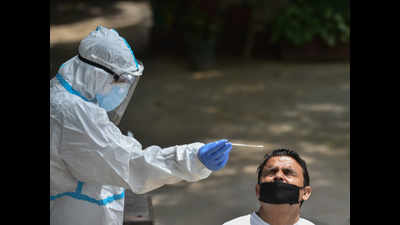- News
- City News
- thiruvananthapuram News
- Covid-19: Vulnerable groups fall easy prey to cluster infection in Thiruvananthapuram
Trending
This story is from August 5, 2020
Covid-19: Vulnerable groups fall easy prey to cluster infection in Thiruvananthapuram
Around 16% of total indigenous cases being reported in the district in the past one week belongs to the vulnerable category; children aged below 10 and elderly people above 60. Analysis of figures since July 25 till August 4 shows that cluster formation has been most threatening for vulnerable category.

Image used for representational purpose only
THIRUVANANTHAPURAM: Around 16% of total indigenous cases being reported in the district in the past one week belongs to the vulnerable category; children aged below 10 and elderly people above 60. Analysis of figures since July 25 till August 4 shows that cluster formation has been most threatening for vulnerable category.
Elderly people and children from clusters like Anchuthengu, Kochuthura, Pulluvila, Thekkinmoodu, Parassala and Poovar have fallen easy preys to infection.
While densely populated colonies pose enough challenges already in terms of prevention of infection, the manner in which vulnerable sections contract infection in clusters adds to the woes of district administration. Even after a month since clusters emerged in the district cutting across panchayats, rural areas and coastal communities, presence of positive cases among vulnerable sections indicate there is more work to be done in ensuring reverse quarantine.
Four persons aged above 90 from Puthukurichi, Kochuthura and Vanchiyur are also in the list of infected person. A 94 year old man from Puthukurichi is the oldest person to be infected and under treatment at present. For all the cluster containment strategy and steps for reverse quarantine in closely residing communities which have been pitched since the first week of July , 24 persons aged 80 and above contracted infection between July 25 and August 4. The fact that these many people under a highly vulnerable age group got infected even after three weeks of formation of clusters in the district stresses the need for augmenting steps to prevent infection among such age groups.
When 27 inmates of an old age home were infected with Covid-19 and brought to General hospital, the authorities had to deal with unexpected challenges. It took two days before staff could be identified specifically for their care and until then a care taker who was also tested positive for Covid-19 and under treatment took up the job of feeding them and changing their bed sheets and taking them to toilets unmindful of her body pain and weakness.
Figures show that four deaths that were officially recorded during the one week were in the age group 60-70 except for one person who was 53. Even in the first week of community spread at Poonthura, 18% of total indigenous cases were from vulnerable category. The officials point out that enforcing reverse quarantine in densely populated colonies is nearly non-viable and setting up alternative facilities brings with it another set of challenges.
Elderly people and children from clusters like Anchuthengu, Kochuthura, Pulluvila, Thekkinmoodu, Parassala and Poovar have fallen easy preys to infection.
While densely populated colonies pose enough challenges already in terms of prevention of infection, the manner in which vulnerable sections contract infection in clusters adds to the woes of district administration. Even after a month since clusters emerged in the district cutting across panchayats, rural areas and coastal communities, presence of positive cases among vulnerable sections indicate there is more work to be done in ensuring reverse quarantine.
Four persons aged above 90 from Puthukurichi, Kochuthura and Vanchiyur are also in the list of infected person. A 94 year old man from Puthukurichi is the oldest person to be infected and under treatment at present. For all the cluster containment strategy and steps for reverse quarantine in closely residing communities which have been pitched since the first week of July , 24 persons aged 80 and above contracted infection between July 25 and August 4. The fact that these many people under a highly vulnerable age group got infected even after three weeks of formation of clusters in the district stresses the need for augmenting steps to prevent infection among such age groups.
Two kids aged just six months old have also been infected. This is in addition to around 20 kids aged below 10, mostly 1 year who have been infected through local transmission. The district administration and health department have set up a reverse quarantine facility at Vallakadavu. The authorities are also toying with the idea of engaging community leaders to run reverse quarantine facilities since many local bodies are too stretched, financially and logistically to take care of reverse quarantine facilities.
When 27 inmates of an old age home were infected with Covid-19 and brought to General hospital, the authorities had to deal with unexpected challenges. It took two days before staff could be identified specifically for their care and until then a care taker who was also tested positive for Covid-19 and under treatment took up the job of feeding them and changing their bed sheets and taking them to toilets unmindful of her body pain and weakness.
Figures show that four deaths that were officially recorded during the one week were in the age group 60-70 except for one person who was 53. Even in the first week of community spread at Poonthura, 18% of total indigenous cases were from vulnerable category. The officials point out that enforcing reverse quarantine in densely populated colonies is nearly non-viable and setting up alternative facilities brings with it another set of challenges.
End of Article
FOLLOW US ON SOCIAL MEDIA










